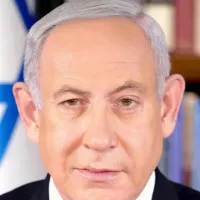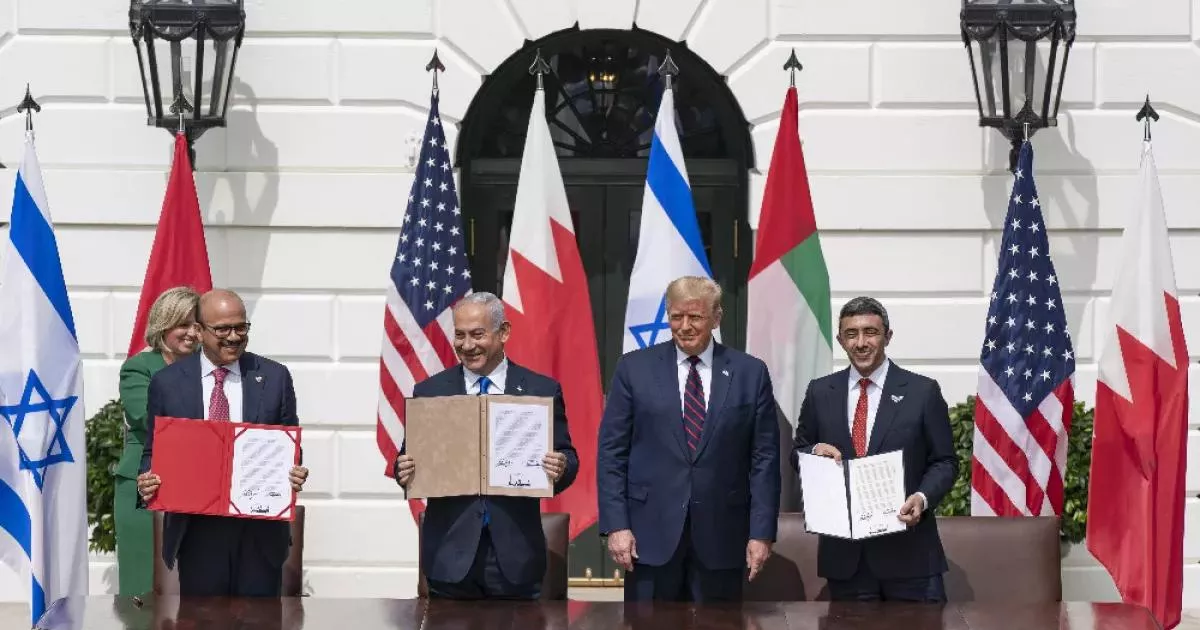The Abraham Accords are a series of normalization agreements between Israel and several Arab nations, brokered by the United States under President Donald Trump, beginning in 2020. The UAE and Bahrain were the first to normalize relations with Israel since Jordan in 1994, followed by Sudan and Morocco. These agreements involved diplomatic recognition and cooperation across various sectors. The accords signified a shift in Middle Eastern politics and U.S. foreign policy in the region. There was reporting that a second Trump administration would seek to expand the Accords to include other nations, such as Saudi Arabia.
1991: Madrid Peace Conference
In 1991, the Madrid Peace Conference set the stage for the Oslo Accords.
October 2018: Netanyahu Visits Oman
In October 2018, Israeli Prime Minister Netanyahu, accompanied by his national security advisor and the head of Mossad, visited Oman to advance the peace process and discuss matters of joint interest regarding peace and stability in the Middle East.
October 2018: Israeli Sports Minister attends Judo Grand Slam Abu Dhabi
In October 2018, the Israeli sports minister attended the 2018 Judo Grand Slam Abu Dhabi. Two Israeli judokas won gold medals, and Israel's national anthem was played during the award ceremonies, marking a first at Gulf state sporting events.
February 2019: Warsaw Conference Aims to Build Coalition Against Iran
In February 2019, the Warsaw Conference, proposed by the US, aimed to build a coalition against Iran. Representatives from 70 nations attended, including Arab officials, marking the first time since the 1991 Madrid Peace Conference that an Israeli leader and senior Arab officials were at the same international conference focused on the Middle East.
January 2020: Trump Announces Peace Plan for the Middle East
In January 2020, President Trump announced the Trump peace plan for the Middle East alongside Israeli prime minister Benjamin Netanyahu, proposing a unified Jerusalem as Israel's capital and Israeli sovereignty over the Jordan Valley and West Bank settlements.
May 2020: Netanyahu Hints at Annexation Discussions
In May 2020, after taking office, Netanyahu hinted that his cabinet would begin discussing annexation of parts of the West Bank, as envisioned in the Trump peace plan, in July.
June 12, 2020: Emirati Ambassador Warns Against Annexation
On June 12, 2020, Emirati ambassador to the US Yousef Al Otaiba published an op-ed in Yedioth Ahronoth, warning that Israel's planned annexation of West Bank territory would halt any normalization of relations with the Emirates and other Arab states.
June 2020: Emirates Offer Normalization in Exchange for Suspension of Annexation
In June 2020, Al Otaiba communicated that the Emirates would agree to normalization with Israel if Israel announced that West Bank annexation was off the table. The White House also had reservations about annexation.
July 2, 2020: Al Otaiba Meets with Berkowitz to Discuss Normalization Plan
On July 2, 2020, Al Otaiba met with Berkowitz to further discuss the plan for normalization in exchange for shelving annexation plans.
August 2020: Normalization Agreement Reached
In August 2020, a normalization agreement was reached, leading to the postponement of annexation plans.
August 2020: Emirates Establish Telephone Links to Israel
In August 2020, the Emirates established telephone links to Israel for the first time by unblocking direct dialing to Israel's +972 country code.
September 15, 2020: Abraham Accords Signed
On September 15, 2020, the Abraham Accords, which established diplomatic normalization between Israel, the United Arab Emirates, and Bahrain, were signed in Washington, D.C. The United States, under President Donald Trump, mediated the Accords.
October 23, 2020: Israel and Sudan Agree to Normalize Ties
On October 23, 2020, Israel and Sudan agreed to normalize ties in an agreement mediated by Trump administration officials. The US removed Sudan from its list of state sponsors of terrorism and provided a US$1.2 billion loan to help clear the country's debts to the World Bank.
December 10, 2020: Israel and Morocco Agree to Establish Full Diplomatic Relations
On December 10, 2020, President Trump announced that Israel and Morocco had agreed to establish full diplomatic relations. As part of the deal, the United States agreed to recognize Moroccan sovereignty over the Western Sahara.
December 2020: Delegation from the Emirates and Bahrain visit Israel
In December 2020, a delegation from the Emirates and Bahrain visited Israel, the occupied Golan Heights and Jerusalem for cultural exchange as part of the normalization process. The delegations met with Israel President Reuven Rivlin.
2020: Israeli defense exports to normalized countries reach $791 million
According to Israel's Ministry of Defense, in 2020, the value of Israeli defense exports to countries with which it normalized relations reached $791 million.
2020: Secret oil deal struck between Israel and the Emirates
In 2020, a secret oil deal between Israel and the Emirates was struck as part of the Abraham Accords.
January 6, 2021: Sudan Signs Abraham Accords Declaration
On January 6, 2021, the government of Sudan signed the "Abraham Accords Declaration" in Khartoum.
February 2021: US Continues to Urge Normalization with Israel
In February 2021, after Trump left office, the US State Department stated that it would continue to urge other countries to normalize relations with Israel and emphasized that normalization is not a substitute for Israeli-Palestinian peace.
March 2021: Biden Administration Supports Widening Normalization Process
In March 2021, it was reported that the Biden administration supports widening the normalization process to other countries and prefers the term "normalization process" to "Abraham Accords." A group of US senators introduced a bill to strengthen and expand the Abraham Accords.
March 2021: Israeli and Emirati national rugby teams play first match
In March 2021, the Israeli and Emirati national rugby teams played their first-ever match in honor of the Abraham Accords.
March 27, 2021: Event to commemorate International Holocaust Memorial Day
On March 27, 2021, an event was organized to commemorate International Holocaust Memorial Day, with participation from the Emirates, Bahrain, Morocco, and Saudi Arabia.
May 2021: Criticism of Abraham Accords Increases After Violence Erupts
In May 2021, criticism of the normalization agreements increased after violent protests erupted in Jerusalem, Hamas fired rockets into Israel, and Israel retaliated with airstrikes on Gaza, due to the failure to make progress resolving the Palestinian conflict.
August 14, 2021: Report of secret oil deal turning Eilat into waypoint for Emirati oil
On August 14, 2021, the Associated Press reported that a secret oil deal between Israel and the Emirates, struck in 2020 as part of the Abraham Accords, had turned the Israeli resort town of Eilat into a waypoint for Emirati oil headed for Western markets, potentially endangering Red Sea reefs.
August 2021: Algeria Cuts Relations with Morocco, Citing Abraham Accords
In August 2021, Algeria cited the Abraham Accords as one of the reasons for unilaterally cutting relations with Morocco.
September 2021: Film "Finding Abraham" premiered at the UN
In September 2021, the film "Finding Abraham", which documented the influencers' visit to Magen David Adom, premiered at the UN on the anniversary of the signing of the Abraham Accords.
November 2021: Israel, Emirates, and Jordan sign letter of intent for electricity and water sale
In November 2021, Israel, the Emirates, and Jordan signed a letter of intent for the sale of 600 MW of electricity annually to Israel, produced by solar farms in Jordan built by the UAE government-owned Masdar. In return, Israel would sell 200 million cubic meters of desalinated water to Jordan each year.
November 2021: Israel Signs Security Agreement with Morocco
In November 2021, Israeli Minister of Defense Benny Gantz signed a joint security understandings agreement with Moroccan defense minister Abdellatif Loudiyi, marking the first time Israel openly signed such an agreement with an Arab state, formalizing defense ties.
November 2021: OurCrowd Arabia becomes first Israeli venture capital firm licensed by ADGM
In November 2021, OurCrowd Arabia became the first Israeli venture capital firm to receive a license from the Abu Dhabi Global Market (ADGM), marking a significant step in formal economic cooperation between Israel and the Emirates.
November 2022: OurCrowd launches Integrated Data Intelligence Ltd. (IDI) in Abu Dhabi
In November 2022, OurCrowd launched Integrated Data Intelligence Ltd. (IDI), an artificial intelligence company for business, in Abu Dhabi as part of a $60 million joint investment with the Abu Dhabi Investment Office. Also in November 2022, fintech company Liquidity Group opened an office as part of a $545 million government incentive program.
November 2022: Poll shows negative views of Abraham Accords among Saudis
In November 2022, a poll indicated that 76% of Saudi respondents held negative views of the Abraham Accords.
February 2, 2023: Israel and Sudan Finalize Normalization Agreement
On February 2, 2023, Israel and Sudan announced they had finalized an agreement to normalize relations, with the signing to occur after the establishment of a civilian government in Sudan. However, normalization faces opposition and has been delayed due to fighting between rival military factions.
June 2023: US warns Israel that tensions with Palestinians threatened normalization
In June 2023, U.S. Secretary of State Antony Blinken cautioned Israel that escalating tensions with the Palestinians, including through increased settlement activity, posed a threat to the expansion of normalization agreements with Arab countries, especially Saudi Arabia. The Saudi Foreign Minister also stated that progress on peace for the Palestinian people was needed for normalization to have benefits.
November 2023: Purchase agreements removed from COP28 climate change conference agenda
In November 2023, the purchase agreements for the electricity and water deal between Israel, the Emirates and Jordan, initially scheduled to be signed at the COP28 climate change conference in Dubai, were removed from the agenda due to the Gaza war.
December 6, 2023: Survey shows strong Saudi support for cutting ties with Israel
According to a poll conducted between November 14 and December 6, 2023, 96% of Saudi participants believed that Arab nations should cut ties with Israel, and only 16% of Saudis approved of Hamas accepting a two-state solution.
July 2025: Trump administration initiates expansion of accords to include Syria, Lebanon and Saudi Arabia
Following the end of hostilities between Iran and Israel in July 2025, the second Trump administration initiated the expansion of the Abraham Accords to include Syria, Lebanon, and Saudi Arabia, with direct dialogues reportedly taking place between Israel and Syria.
September 29, 2025: Trump announces Israel agreed to the Trump 21-Point Gaza Peace Plan
On September 29, 2025, Donald Trump announced that Israel had agreed to the Trump 21-Point Gaza Peace Plan during a White House press conference, and suggested the potential expansion of the Abraham Accords to include more countries, including Iran.
Mentioned in this timeline

Donald John Trump is an American politician media personality and...
The United States of America is a federal republic located...

The White House located at Pennsylvania Avenue NW in Washington...

Benjamin Bibi Netanyahu is a prominent Israeli politician and diplomat...
Saudi Arabia officially the Kingdom of Saudi Arabia KSA is...
Sudan officially the Republic of the Sudan is a country...
Trending

10 months ago Carlos Alcaraz Withdraws from Barcelona Open; Faces Tough Draw with Tsitsipas, De Minaur

2 months ago Wesley Sneijder predicts Kylian Mbappé to win Ballon d'Or in upcoming year.

8 months ago Steven Adams secures a 3-year, $39M extension with the Houston Rockets.
3 months ago McDonald's Employee Shoots Customer After Argument Over Delayed Order in Florida.

3 months ago Spoelstra regrets Ware decision after Heat loss; Knecht as superstar solution?

8 months ago Polio Eradication Efforts Intensify in Pakistan: Focus on Women Heroes and Campaigns
Popular

Thomas Douglas Homan is an American law enforcement officer who...

William Franklin Graham III commonly known as Franklin Graham is...

Jupiter is the fifth and largest planet from the Sun...

XXXTentacion born Jahseh Dwayne Ricardo Onfroy was a controversial yet...

Kristi Noem is an American politician who has served as...

Instagram is a photo and video-sharing social networking service owned...
